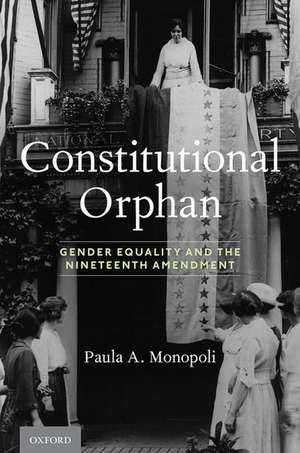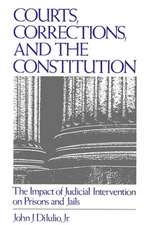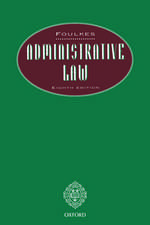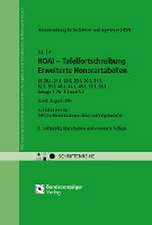Constitutional Orphan: Gender Equality and the Nineteenth Amendment
Autor Paula A. Monopolien Limba Engleză Hardback – 16 oct 2020
Preț: 252.15 lei
Nou
Puncte Express: 378
Preț estimativ în valută:
48.25€ • 51.59$ • 40.23£
48.25€ • 51.59$ • 40.23£
Carte tipărită la comandă
Livrare economică 07-12 aprilie
Preluare comenzi: 021 569.72.76
Specificații
ISBN-13: 9780190092795
ISBN-10: 0190092793
Pagini: 256
Dimensiuni: 236 x 160 x 28 mm
Greutate: 0.52 kg
Editura: Oxford University Press
Colecția OUP USA
Locul publicării:New York, United States
ISBN-10: 0190092793
Pagini: 256
Dimensiuni: 236 x 160 x 28 mm
Greutate: 0.52 kg
Editura: Oxford University Press
Colecția OUP USA
Locul publicării:New York, United States
Recenzii
In this path breaking new book, Paula Monopoli bridges conversations in history and law to ask why the Nineteenth Amendment has been overlooked and become a "Constitutional Orphan" in the Constitution's interpretation ... Her magnificent recovery of this history will enable the Amendment's more robust and intersectional interpretation and enforcement in the years ahead.
With Constitutional Orphan, Monopoli adds women's legal history back into the constitutional canon. Her impeccably researched work provides the definitive account of the post-ratification Nineteenth Amendment.
As Paula Monopoli reveals in her fascinating and important new book, Constitutional Orphan, the 19th Amendment was abandoned by Congress and the courts--even by the erstwhile suffragists ... Deftly weaving together historical insights and legal analysis, Professor Monopoli makes a meaningful, if heartbreaking, contribution to the centennial ...
[W]ith Constitutional Orphan, Paula Monopoli ... provides a nuanced and vital interpretation of the promises and limits of changes in constitutional law.
In Constitutional Orphan, Paula Monopoli makes a significant contribution to discussions about the meaning of the Nineteenth Amendment itself ... show[ing] that without congressional guidance or ongoing attention from organized suffragists, the state courts neither reached the same conclusions nor worked from common understandings of federalism or political rights.
In Constitutional Orphan, Monopoli weaves how race, gender, and class in America during the early 20th century limited the scope of the Nineteenth Amendment to merely an amendment related to voting. This intersectionality makes this book a must-read for legal scholars interested in how race, gender, and class impact the American legal tradition. Monopoli's arguments are well reasoned and supported by authority. Her highly readable writing style retains an academic tone, with extensive footnotes to important primary sources and a comprehensive index.
With Constitutional Orphan, Monopoli adds women's legal history back into the constitutional canon. Her impeccably researched work provides the definitive account of the post-ratification Nineteenth Amendment.
As Paula Monopoli reveals in her fascinating and important new book, Constitutional Orphan, the 19th Amendment was abandoned by Congress and the courts--even by the erstwhile suffragists ... Deftly weaving together historical insights and legal analysis, Professor Monopoli makes a meaningful, if heartbreaking, contribution to the centennial ...
[W]ith Constitutional Orphan, Paula Monopoli ... provides a nuanced and vital interpretation of the promises and limits of changes in constitutional law.
In Constitutional Orphan, Paula Monopoli makes a significant contribution to discussions about the meaning of the Nineteenth Amendment itself ... show[ing] that without congressional guidance or ongoing attention from organized suffragists, the state courts neither reached the same conclusions nor worked from common understandings of federalism or political rights.
In Constitutional Orphan, Monopoli weaves how race, gender, and class in America during the early 20th century limited the scope of the Nineteenth Amendment to merely an amendment related to voting. This intersectionality makes this book a must-read for legal scholars interested in how race, gender, and class impact the American legal tradition. Monopoli's arguments are well reasoned and supported by authority. Her highly readable writing style retains an academic tone, with extensive footnotes to important primary sources and a comprehensive index.
Notă biografică
Paula A. Monopoli is the Sol & Carlyn Hubert Professor of Law at the University of Maryland Carey School of Law. An elected member of the American Law Institute, Professor Monopoli received her B.A. from Yale College and her J.D. from the University of Virginia School of Law. In addition to Constitutional Orphan, Professor Monopoli is the author, editor and co-author of three previous books, American Probate, Law and Leadership, and Contemporary Trusts and Estates, as well as a number of articles including Gender and Constitutional Design in the Yale Law Journal. She has been a Visiting Scholar at the Moller Institute, Churchill College, University of Cambridge, and is an Academic Fellow of the American College of Trust and Estate Counsel.














